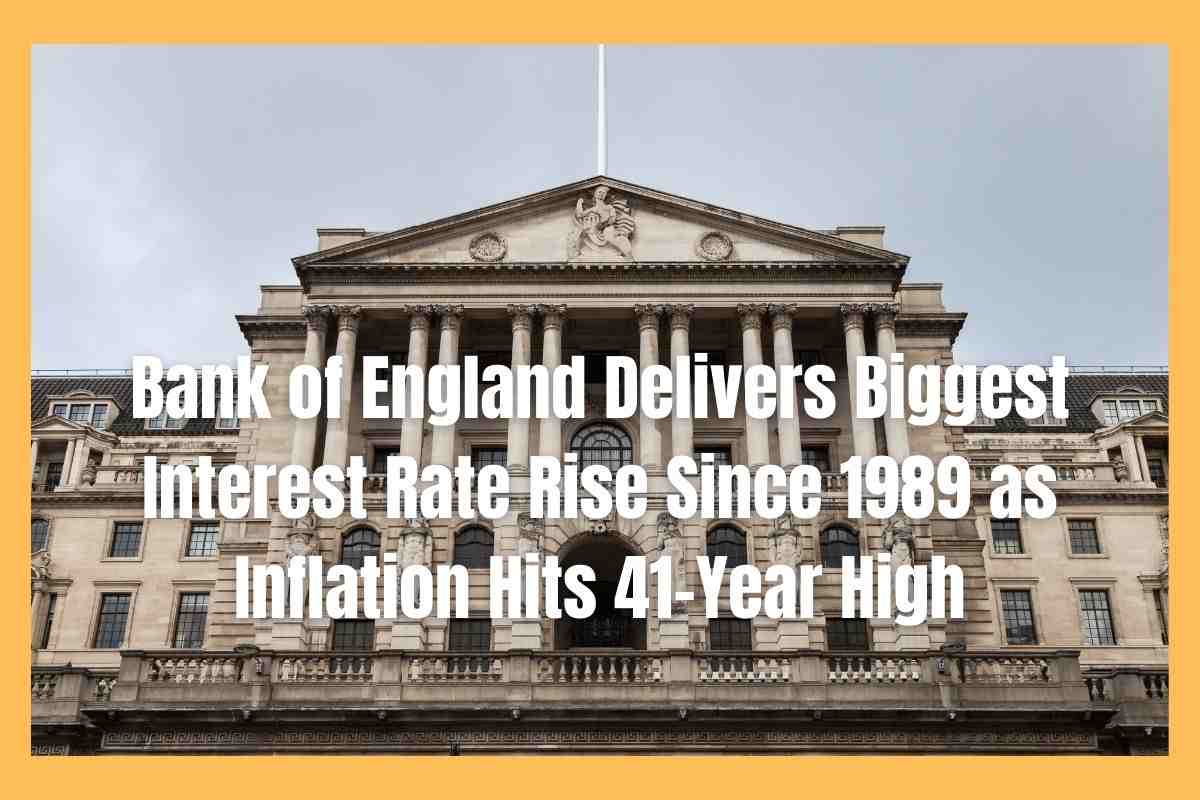The Bank of England Delivers Biggest Interest Rate Hike Since 1989 to Curb Inflation
The Bank of England (BoE) raised its base interest rate by 0.75% to 3% on November 3rd, 2022, marking the biggest single interest rate hike since 1989. The move comes as the central bank aggressively looks to curb inflation which has hit a 41-year high of 11.1% in October 2022.
This increase takes the main interest rate to the highest level since 2008. It is the eighth consecutive rise in borrowing costs by the Bank of England as it battles the inflation crisis.
Inflationary Pressures Force Bank of England’s Hand
Persistently high inflation has put pressure on the BoE to act aggressively and match the rapid pace of rate hikes made by the US Federal Reserve. The Consumer Prices Index (CPI) measure of inflation rose to 11.1% in October, over five times the BoE’s 2% target.
Some of the major factors pushing inflation upwards include:
- High energy and fuel prices exacerbated by Russia’s invasion of Ukraine
- Global supply chain disruptions and rising import costs
- Tight labour market driving up wage growth
- Lingering post-pandemic demand
The BoE is raising rates in an attempt to dampen consumer demand and slow the economy. This should help relieve inflationary pressures over time. However, higher interest rates also risk tipping the UK into a recession.
0.75 Percentage Point Rise Matches Market Expectations
The Monetary Policy Committee of the BoE voted 7-2 in favour of lifting rates by 0.75 percentage points to 3%. This matched financial market expectations following the hawkish tone of previous BoE communications.
In the September 2022 meeting, the central bank had raised rates by only 0.5 points but indicated larger hikes were likely needed to control inflation.
BoE Governor Andrew Bailey said all policymakers saw the need for stronger action at the November meeting while acknowledging the economic risks.
The bank expects inflation to peak at around 11% in 2022 before gradually declining.
Highest Interest Rate Since 2008 Financial Crisis
The 3% base rate is now at the highest level since the global financial crisis in late 2008. The quarter-point rise in September was already the biggest hike since 1995.
Between 2006 and mid-2022, the BoE base rate stayed very low, at or near 0.5%, before beginning its climb upwards. Rates had been reduced to stimulate the economy during the Great Recession.
The period of low-interest rates is now decisively over as the BoE tries to lower demand and avoid a wage-price spiral. Its decision has major implications for consumer borrowing costs, business loans and mortgage rates.
Impact on Households and Businesses
The BoE’s rate rise will feed through into higher costs for borrowing on mortgages, credit cards and other loans.
According to estimates from the UK Treasury, the typical household with a variable mortgage could see their annual mortgage payments rise by around £3,000 per year if interest rates hit 5%.
However, the BoE stressed that over 75% of mortgage holders are protected by fixed rates. Banks have also built up capital buffers and profit margins in recent years to withstand economic shocks.
For businesses, higher interest rates will push up the cost of borrowing to invest and grow. However, ensuring inflation returns to target will support longer-term planning and avoid runaway price rises.
The central bank admitted growth will continue to slow amid the squeeze on real incomes. The UK economy already shrank by 0.2% between July and September.
Outlook for Further Rises
Financial markets expect the BoE base rate to rise beyond 4% in 2023 based on inflation projections. However, the central bank indicated rates may not go up as high as the market expects.
The Monetary Policy Committee meets every month to set interest rates. Their decisions will continue to be data-driven based on incoming economic statistics.
Some economists argue tightening monetary policy too aggressively could tip the UK into a prolonged downturn.
However, bringing inflation back towards the 2% target remains the overriding focus for policymakers.
Ongoing geopolitical events, such as the war in Ukraine, will also influence how quickly inflation cools. Any further supply shocks in energy markets could fuel inflation and force the BoE to hike rates higher.
Conclusion:
The Bank of England has decisively raised interest rates in its battle to tame spiralling inflation. Hiking its base rate by 0.75 percentage points to 3% in November 2022 represents the biggest single increase since 1989.
The central bank shows readiness to take forceful action to curb inflationary pressures, even at the risk of recession.
All eyes will now be on how quickly and effectively this surge in borrowing costs helps bring UK inflation back towards target






